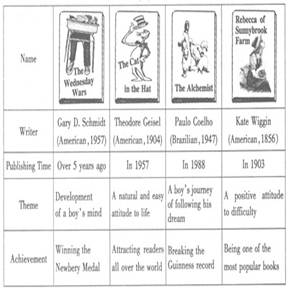题目内容
One day in March ,1964, Alaska began to shake . There was a great earthquake .It was the biggest earthquake the country ever had .
Shops and houses fell down . One street dropped 30 feet. One island rose about 11 metres into the air . Parts of the sea bottom became dry land . People felt the earthquake hundreds of kilometers away .
Each year there are many earthquakes . Most of them are small . They happen in different parts of the world . We are not sure what makes them . But if you are near , you can see the earth move . You may see a big crack (裂缝) in the ground . Sometimes the land drops on one side of the crack . There is a new hill . The old world has a new shape (形状).
根据短文判断下列句子正(T)误(F).
小题1:The strongest earthquake in Alaska happened in April 1967.
小题2:The word“earthquake”in the story means a strong shaking or moving of the ground .
小题3:The story wants to tell us earthquakes changed the land .
小题4:From the story we know earthquakes happen in small countries .
小题5:From this story we can see earthquakes often do a lot of harm .
Shops and houses fell down . One street dropped 30 feet. One island rose about 11 metres into the air . Parts of the sea bottom became dry land . People felt the earthquake hundreds of kilometers away .
Each year there are many earthquakes . Most of them are small . They happen in different parts of the world . We are not sure what makes them . But if you are near , you can see the earth move . You may see a big crack (裂缝) in the ground . Sometimes the land drops on one side of the crack . There is a new hill . The old world has a new shape (形状).
根据短文判断下列句子正(T)误(F).
小题1:The strongest earthquake in Alaska happened in April 1967.
小题2:The word“earthquake”in the story means a strong shaking or moving of the ground .
小题3:The story wants to tell us earthquakes changed the land .
小题4:From the story we know earthquakes happen in small countries .
小题5:From this story we can see earthquakes often do a lot of harm .
小题1:F
小题2:T
小题3:T
小题4:F
小题5:T
试题分析:这篇短文简单介绍了1964年3月发生在Alaska的一次大地震,以及地震后的景象;还描述了每年世界上都会有地震发生及地震给这个世界带来的影响。
小题1:细节理解题。根据短文第一段 One day in March ,1964, Alaska began to shake . There was a great earthquake .It was the biggest earthquake the country ever had 描述可知最强地震是发生在1964年3月,而不是1967年4月。故题干描述错误,填F。.
小题2:细节理解题。根据上下文描述,可知地震是指强烈的震动或地球板块的移动,故该句The word“earthquake”in the story means a strong shaking or moving of the ground .描述正确,故填T。
小题3:细节理解题。联系上下文可知,地震可以改变地球的地貌特征,比如地表裂缝,地面下陷,出现新山等。故该句The story wants to tell us earthquakes changed the land .是正确的。故填T。
小题4:推理判断题。根据短文最后一段中They happen in different parts of the world .”描述可知,地震发生在世界的不同地区,当然包括大国家和小国家。故该句From the story we know earthquakes happen in small countries .描述错误,应填F。
小题5:推理判断题。根据短文第二三段信息可知,地震可造成商店房屋倒塌,岛屿上升海底变成陆地等。故该句From this story we can see earthquakes often do a lot of harm .描述正确,应填T。

练习册系列答案
相关题目
